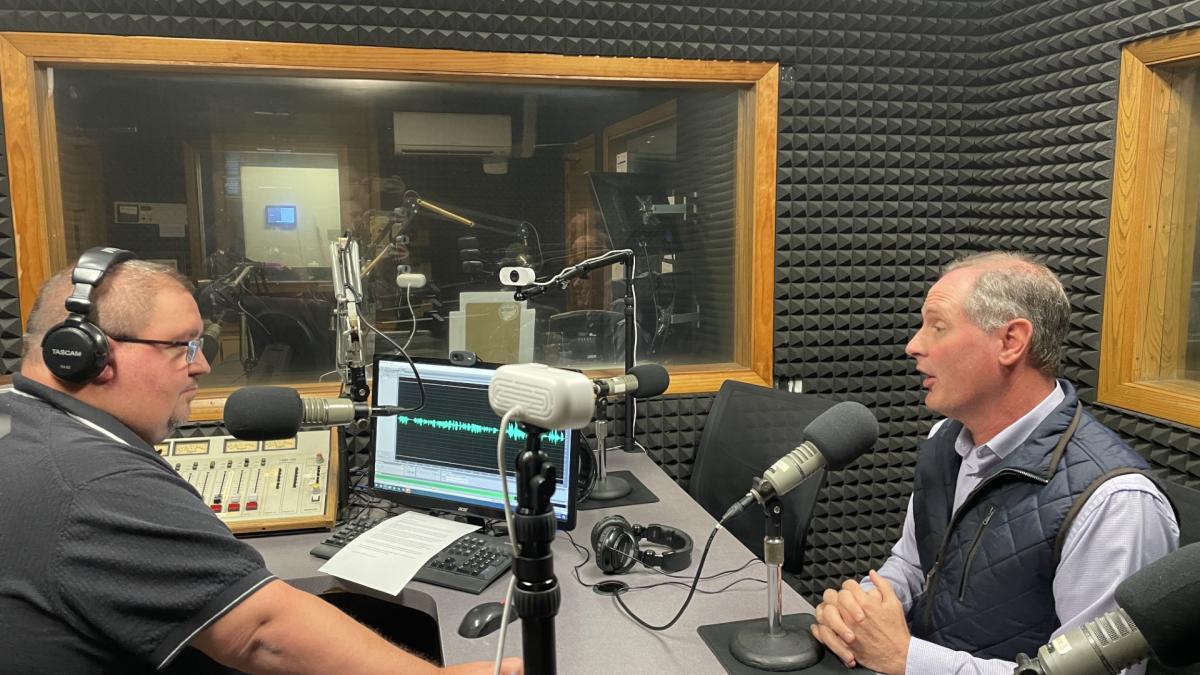Rep. Mann visits Manhattan as government shutdown stretches into third week

As the federal government shutdown stretches into its third week, U.S. Rep. Tracey Mann (R-Kan.) said the impasse is reaching historic proportions with no clear compromise on the horizon.
“This is the third-longest shutdown ever — and the longest full shutdown,” he said Tuesday in an interview on KMAN’s Morning News this week. “Democrats need to end this political stunt and reopen the government.”
The longest federal government shutdown in history was 35 days from Dec. 22, 2018 to Jan. 25, 2019 under the first Trump administration and a split Congress. The second longest shutdown prior to Tuesday was Dec. 16, 1995 to Jan. 5, 1996 under President Bill Clinton and a Republican-controlled Congress. That lasted 21 days, which the current shutdown has now passed.
Mann said he voted more than a month ago on a measure that passed the House but stalled in the Senate that would have kept the government funded through Nov. 21. Despite Republicans having majorities in both chambers, 60 votes are needed to advance any bill with a supermajority. Republicans hold 53 seats in the Senate.
The shutdown continues to impact federal workers, including airport staff, border patrol agents and farm service employees, many of whom were furloughed or are working without pay.
“The president was able to shuffle some money around to get the troops paid and some tariff funds are keeping the WIC program afloat,” Mann said. “But those dollars are going to run out and we need to reopen the government.”
Mann was in town Tuesday for a tour of Manhattan Regional Airport, where he visited with airport staff including air traffic controllers. He said about 25 Transportation Security Administration workers at the airport will soon be working without pay if Congress cannot reach a deal to end the shutdown.
“I think everyone would agree that the right thing for the country is to fund the government and pay people that are actually doing the jobs that they’re called to do,” he said.
With holidays just weeks away, Mann said he doesn’t anticipate delays or closures will impact Manhattan’s airport, as he said TSA “has to continue to show up,” despite the shutdown. Mann said the longer the shutdown goes brings higher risk of delays.
“I’m hearing reports at the Atlanta airport that there are delays where not as many folks are coming in,” he said. “There might be some air traffic issues and concerns and other parts of the country, but I don’t anticipate that in Kansas.”
In addition to the shutdown, Mann said the U.S. Department of Agriculture continues to monitor the potential threat of New World Screwworm on the U.S. livestock industry.
The parasitic fly can devastate livestock populations and has done so in parts of Mexico and Central America. While the pest hasn’t crossed into the United States, Mann said USDA remains aggressive in keeping it from reaching the border.
“The larvae can infect cattle and be very detrimental,” Mann said. “We’ve seen outbreaks decades ago, but we were able to eradicate them — and we have to make sure it stays that way.”
He said the USDA uses an established method to control the insect’s spread: breeding and releasing millions of sterile flies that mate with infected ones, stopping reproduction and eliminating the population over time.
“So far, we’ve released about 3 billion sterile flies,” Mann said. “There are even new production facilities being built to ramp that up further. We’re watching closely to make sure it doesn’t get into our country.”